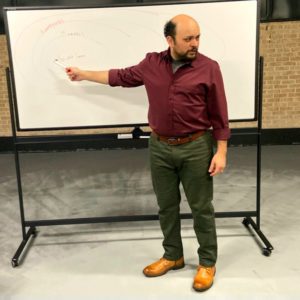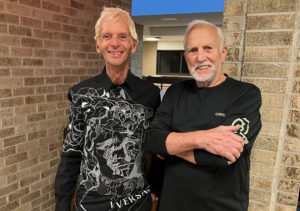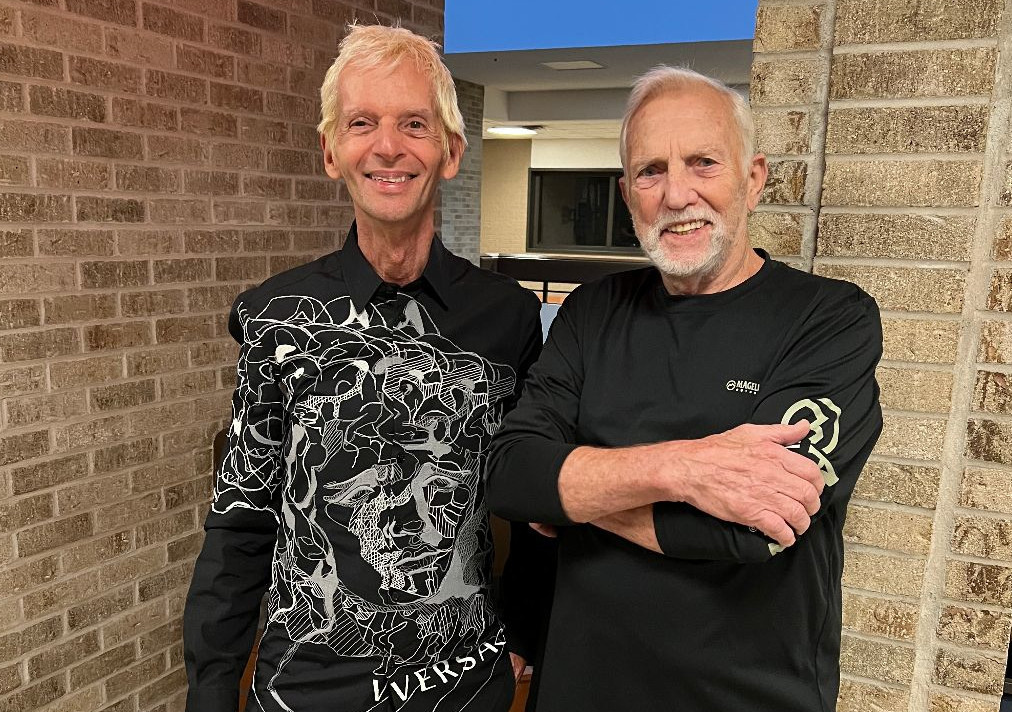While Don Toner is not retiring, there is a big change now underway at Austin Playhouse.
The Catastrophist, a play that opened March 25, is Toner’s last under the title Co-Producing Artistic Director. He will continue to serve on the Board of Directors and the Capital Campaign Committee. His daughter Lara will take over as artistic director.
“This transition,” Toner wrote for the press, “has been long-time in the making. Lara has led our operations during the pandemic and with the new additions to the team, Austin Playhouse is in a wonderful position to continue and grow for many seasons. I look forward to just directing what I really want, plays like The Catastrophist that really move me. And I’ll be focusing on our capital campaign to finally fulfill our dream of a permanent home for Austin Playhouse.”
Toner founded Austin Playhouse in 2000 after previously working at Austin’s Live Oak/State Theatre Company (Producing Artistic Director), Cincinnati Playhouse in the Park (Associate Producer/Director), Los Angeles Theatre Center (Associate Producer), Bucks County Playhouse (Production Stage Manager/Director), New Stage Theatre (Artistic Director), and founding the Theatre Center of Mississippi – the State’s first Equity theatre.
“After almost three years away from live performances, I’m very excited to be directing one of the first productions of this incredibly relevant and moving new play by Lauren Gunderson,” said Toner. “It’s such a joy to return to the theatre and to be directing Ben Wolfe in a tour-de-force performance as well as working with Stage Manager Barry Miller. Barry has worked as an actor or a stage manager with me for over 30 years, appearing in the first play I directed in Austin.”

For actor Ben Wolfe, this is a one-man play. He did an outstanding job. With a lot of emotional upheaval to present, it’s very draining when you don’t have another person to spark off of. He was very convincing.
Somewhat less convincing was the play itself. In poetry, the type known as didactic (meaning instructional or educational) was a popular form for centuries. Many people (those who could read) learned much of what they knew about studies of the natural world from reading poetry. But by the early 1800s, such a prominent poetic voice as Shelley declared didactic poetry to be an abhorrence, and it has never experienced a renewal since. In the last few years there have been a few didactic plays, notably Copenhagen (1998) about early atomic theory, and Silent Sky (2015) about women astronomers at Harvard in the early 20th century. The Catastrophist is another entry into this small stable of didactic plays, this one dealing with viruses and pandemics. Unlike the others, this one is about recent research (notably Ebola in 2014, but not the current Covid outbreak).
Playwright Lauren Gunderson, perhaps unwittingly, poses a conundrum at the beginning of the play. The subject of her play is her own husband, the virologist Dr. Nathan Wolfe. In the person of actor Ben Wolfe (same surname but I assume not related) he states “Theatre is not science, it is the opposite.” How then to present science in a theatrical form? Perhaps ironically, he then says “It’s a risk being married to a playwright.”
As if to emphasise we are in the classroom being instructed here, Wolfe pulls out a whiteboard to draw a diagram explaining how humanity relates to other organisms that live on Earth, with viruses residing in a completely separate realm of their own. His point is that “the tree of life doesn’t give a shit about humans. Humans are not the peak of evolution. As for viruses, they are ubiquitous and actually represent 8% of the human genome.” His discussion of the viral material it was very clearly explained, written at a layman’s level, but I wonder how many people found it a worthy theatrical experience. Kudos to the actor for imbuing all this with some enthusiasm.
In the last half the play takes a very different turn. Essentially taking the didactic to its furthest possible level, the playwright looks at her husband’s personal life, including the birth of their children and his genetically-inherited cardiac condition (it was endemic in his family, with men typically dying at age 40).
He offered a weak and unconvincing explanation for not taking proactive care of his medical condition. Speaking as a professional scientist myself, this is especially unconscionable from a scientist. In the absence of any family history of cardiac issues that I regarded as potentially inheritable, I had a very thorough cardiac analysis done 4 years ago. The result was a textbook-perfect heart and artery situation. Anyone who does have such a family history but fails to be checked must regard Russian Roulette as their favourite game. While I certainly wish the real Dr. Wolfe all the best for a long life, none of his behaviour elicited any sympathy from me. And what of his wife? There is no hint she insisted that he take care of himself before his main artery became 100% blocked and he nearly died.
Many times, people do not see their own shortcomings or problems and choose rather to ignore them than face the consequences. Even though logically the problem may exist they still turn a blind eye to it. This inability to deal with reality can perhaps be excused in those who lack a scientific or literate education, but in this case there is no logical excuse.
The Catastrophist flowed well without dragging, and the sparse set was really all that was required as it did not distract from the message being conveyed. How anyone in the audience perceives its message will be a purely personal experience.
Sun New Austin extends its thanks to Don Toner for a theatre career lasting more than 60 years, with many more to go!
The Catastrophist runs 90 minutes: March 25–April 9, 2022 | Thursday thru Saturday at 8:00 p.m.; Sunday at 5:00 p.m. The Catastrophist premiered in 2021 as a virtual theatre event; it is presented by Austin Playhouse for the first time as live theatre.
Trinity Street Playhouse | 901 Trinity Street, Austin.
Photo by Dr. M. Emanuele: Dr Cliff Cunningham (l) with Don Toner.

